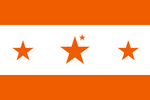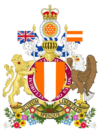United Commonwealth of Victoria
The United Commonwealth of Victoria (U.C.V or UCV; French Commonwealth uni de Victoria or CUV) commonly known as Victoria is a country primarily located in North America. Its 55 commonwealth, one federal district, nine incorporated territories, one major unincorporated territory, and some minor possessions expand from the Atlantic to Pacific Oceans, Northward to the Arctic Ocean and southward to the Caribbean Sea and Columbus Channel. Victoria is the 3rd most populous nation and largest nation in land size. The western land border of Victoria is shared with Tsarskaya Zemlya while the eastern border is shared with Champlain. Victoria also holds limited maritime borders with Cuba, The Dominican Republic, France, Haiti, Spain, Atogoku, The Netherlands, and Venezuela. The nation's capital is Georgetown V.D.C, and its three largest metropolitan areas are New York, Chicago, and Los Angeles.
Indigenous peoples have continuously inhabited what is now Victoria for thousands of years. European's began the exploration of North America beginning with Christopher Columbus' who landed in the modern-day state of The Bahamas in 1492. France, England, and Iberia consolidated control over the Caribbean and eastern North America. As a consequence of various armed conflicts and a rebellion in the colonies, France ceded nearly all of its colonies in North America in 1763. Disputes with Great Britain over taxation and political representation led to the Victorian Revolutionary War (1775–1778), declaring Victorian independence. A ceasefire in the conflict was reached in 1778, the colonies were united into a federal dominion in 1779, while the current constitution was established in 1800. In 1830 the Northeastern Commonwealth of Victoria; Maine, Vermont, New Hampshire, Massachusetts, Rhode Island, and Connecticut were separated from Victoria by The British Empire to quell rampant anti slavery unrest. At the behest of the British, Victoria expanded across North America through the conquest of French, Mexican, Texan and Native territory. Increased autonomy in foreign affairs was granted in 1865 with Victoria declared war on Spain in 18XX. Victoria entered into World War I in 1917 and World War II in 1941, cementing its role as a global superpower. In the Cold War, Victoria and the Soviet Union engaged in proxy conflicts in Korea and Vietnam but avoided direct confrontation. The two superpowers competed in the Space Race, culminating in the 1969 spaceflight that first landed humans on the Moon. In 1991 the collapse of the Soviet Union left Victoria as the world’s biggest superpower.
Victoria is a federal semi-parliamentary democracy and constitutional monarchy in the Westminster tradition. The head of government is the First Minister—who holds office by virtue of their ability to command the confidence of the House of Representatives with support of the Senate. The First Minister is appointed by the President-General, an elected representative of the Monarch, who is Head of State. The country is a Commonwealth realm and is officially bilingual with English and French serving as its two official languages. Fifteen other languages are also recognized by the federal government. It ranks among the highest in international measurements of government transparency, civil liberties, quality of life, economic freedom, and education. It is one of the world's most ethnically diverse and multicultural nations, the product of large-scale immigration from many other countries.
A highly developed country, Victoria has the tenth highest nominal per-capita income globally and ranks highly in several measures of socioeconomic performance, including average wage, human development, and productivity per person. Its advanced economy is the world's largest by nominal GDP and 2nd largest by GDP (PPP). The Victorian economy is considered post-industrial and characterized by the dominance of services. However, the country still retains a significant manufacturing sector. Victoria is a member of several international organizations including the United Nations, Commonwealth of Nations, NATO, the G7, Group of 10, the G20, the World Bank, the International Monetary Fund, the Organisation for Economic Co-operation and Development (OECD), Organization of Victoria Commonwealth (OVC), the Arctic Council, the Organisation internationale de la Francophonie, Asia-Pacific Economic Cooperation among others.
United Commonwealth of Victoria Commonwealth uni de Victoria | |
|---|---|
| Motto: "Scutum Spesque Libertatis" "The Shield of Hope, and the Hope of Liberty" | |
| Anthem: [[Victoria the Beautiful]] |

